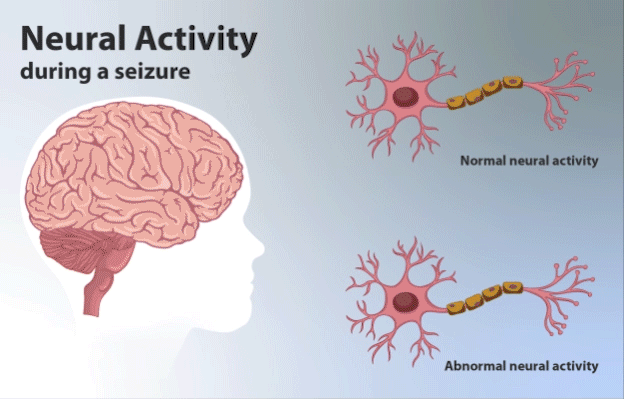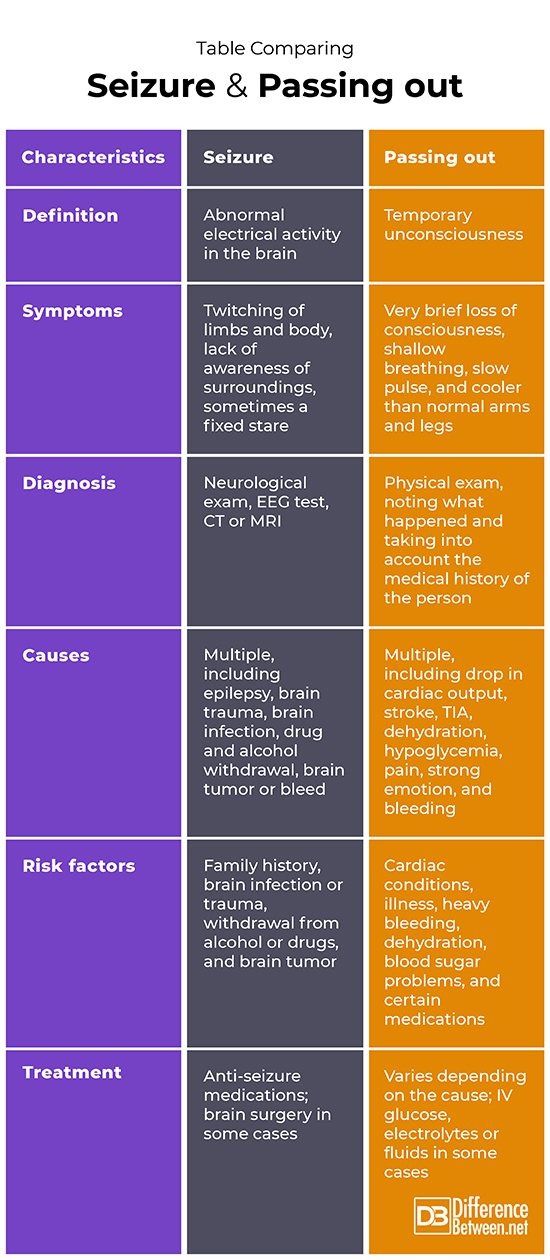Difference Between Seizure and Passing out
A seizure is a state in which there are abnormal electrical impulses in the brain. Passing out is a state in which a person temporarily loses awareness and consciousness.

What is Seizure?
Definition:
A seizure is unusual brain activity due to aberrant electrical impulses occurring in the cortex of the brain.
Symptoms:
Symptoms vary depending on the type of seizure and can include twitching and other uncontrolled motion of the limbs and body, confused mental state, lack of consciousness and awareness, and fixed gaze. The seizure usually lasts up to about 2 minutes and can sometimes result in incontinence.
Diagnosis:
A physical examination and noting the symptoms during a seizure can help with diagnosis. An electroencephalogram, also called an EEG, is a way to evaluate and monitor electrical activity in the brain. It is a useful non-invasive way to determine if a person has epilepsy. A neurological exam is usually done in which the doctor tests how our nervous system is working. A lumbar puncture is also sometimes done, especially if an infection involving your brain is suspected. CT or MRIs can be used to see if there are any tumors, or bleeding in the brain, which could be responsible for seizures.
Causes:
There are many reasons why a person may have a seizure, including head trauma, brain tumor, infection of the brain, neurological condition such as epilepsy, abuse of alcohol and drugs, drug or alcohol withdrawal, and genetics.
Risk factors and treatment:
Substance abuse, head trauma, and family history are risk factors for seizures. The treatment may depend on the cause. Various prescription medications can be used including topiramate, pregabalin, carbamezapine, and gabapentin. There are many types of anti-seizure medications that can work depending on the type of seizure and age of the patient.

What is Passing out?
Definition:
Passing out is when a person falls unconscious for a very short time period. The medical term for passing out is syncope.
Symptoms:
The person loses consciousness and often breathes shallowly, their pulse may be weak and their arms and legs may feel colder than normal. The person becomes limp and does not move, but recovers quickly.
Diagnosis:
Doctors can diagnose syncope based on what happened to the patient and noting any medical conditions that could cause it.
Causes:
The most common cause of passing out is a lack of blood flow to the brain. This can, in turn, be the result of many conditions. A drop in cardiac output from the heart is one possible cause. Cardiac output can be affected by heart disease or heart arrhythmias. A drop in blood pressure can also cause a person to have syncope and this may be for many reasons. Dehydration can result in decreased blood pressure causing syncope. Certain medications can cause syncope as can problems in the brain such as strokes or a TIA. The brain also needs a lot of sugar to function so people with hypoglycemia may end up passing out if glucose in the blood drops too low. Bleeding, pain, and even strong emotion can cause syncope.
Risk factors and treatment:
People who are ill, particularly with certain conditions such as cardiovascular or cerebrovascular problems are at high risk of passing out. Having problems with low blood sugar, or, in the case of women, having heavy menstruation can also predispose one to syncope. Treatment depends on the cause of the syncope. People with low blood sugar are given glucose; people with dehydration are given electrolytes and fluids, while people with heart problems are treated with medication or other interventions.
Difference between Seizure and Passing out?
Definition
Seizures occur because ofabnormal electrical activity in the brain. Passing out or syncope is when a person enters a state of temporary unconsciousness.
Symptoms
The symptoms of a seizure include twitching of limbs and body, lack of awareness of surroundings, sometimes a fixed stare, and sometimes incontinence. The symptoms of passing out are a brief loss of consciousness, shallow breathing, slow pulse, and cooler than normal arms and legs.
Diagnosis
Seizure can be diagnosed using a neurological exam, EEG test, CT or MRI scan, depending on the cause. Passing out is diagnosed through a doctor noting the physical symptoms or hearing what happened and noting any medical conditions that could have caused it.
Causes
Seizures can be due to many conditions including: brain infection or traumatic injury, drug and alcohol withdrawal, brain tumor or bleed. Passing out also has many causes such as a decrease in cardiac output, stroke, TIA, dehydration, hypoglycemia, pain, strong emotion, and bleeding.
Risk factors
Risk factors for seizures include having a brain infection or trauma, withdrawal from alcohol or drugs, brain tumor, or family history. Risk factors for passing out include having some type of cardiac condition, illness, heavy bleeding, dehydration, blood sugar problems, and being on certain medications.
Treatment
Anti-seizure medications and sometimes brain surgery are treatment options for seizures. Treatment choices for passing out depend on the cause, sometimes an IV with glucose or electrolytes may be helpful.
Table comparing Seizure and Passing out

Summary of Seizure Vs. Passing Out
- A seizure is a condition in which electrical impulses in the cortex of the brain are unusual.
- Passing out is also known as syncope and is when a person falls unconscious for a short while.
- Seizures and passing out are both conditions that have multiple causes.
- A seizure can be due to genetic conditions, epilepsy or drug and alcohol withdrawal or some other medical problem.
- Passing out can signify a serious medical problem, such as heart disease, but can also be simply because of strong emotion.
- Difference Between Rumination and Regurgitation - June 13, 2024
- Difference Between Pyelectasis and Hydronephrosis - June 4, 2024
- Difference Between Cellulitis and Erysipelas - June 1, 2024
Search DifferenceBetween.net :
Leave a Response
References :
[0]Image credit: https://storage.needpix.com/rsynced_images/mae-815567_1280.jpg
[1]Image credit: https://commons.wikimedia.org/wiki/File:Depiction_of_neural_activity_during_a_seizure.gif
[2]Adamolekun, Bola. “Seizure disorders”. Merck Manual, 2018, https://www.merckmanuals.com/professional/neurologic-disorders/seizure-disorders/seizure-disorders
[3]Mayo Clinic. “Seizures”. Mayo Clinic, 2020, https://www.mayoclinic.org/diseases-conditions/seizure/symptoms-causes/syc-20365711
[4]Thompson, Andrea D. and Michael J. Shea “Syncope”. Merck Manual, 2018, https://www.merckmanuals.com/professional/cardiovascular-disorders/symptoms-of-cardiovascular-disorders/syncope
